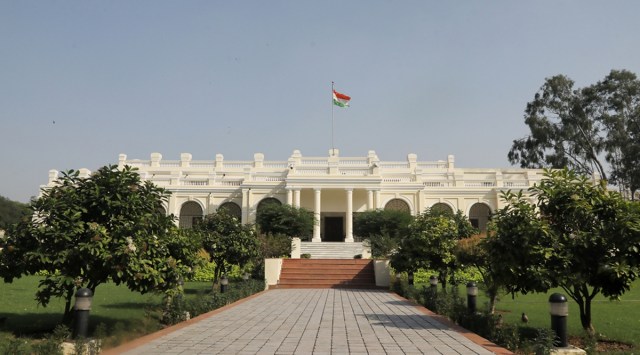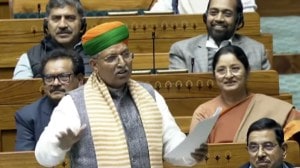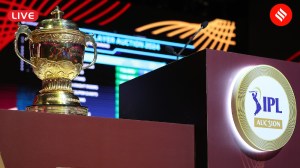Unit on Iqbal axed, nod for new course on Savarkar: DU’s Academic Council approves changes to UG syllabi
Among other decisions passed by the AC was the proposal to set up a Centre for Independence and Partition Studies, and a Centre for Tribal Studies, which were also opposed by some members.
 In a statement issued early Saturday morning, the university justified the decision to drop the unit on Iqbal on the grounds that he ‘laid the foundation to break India’ (express photo)
In a statement issued early Saturday morning, the university justified the decision to drop the unit on Iqbal on the grounds that he ‘laid the foundation to break India’ (express photo)Removal of a unit on Muhammad Iqbal, introduction of a new course on Vinayak Damodar Savarkar or ‘Veer Savarkar’ — Delhi University’s Academic Council (AC), the apex decision-making body on academic matters, approved several changes to the undergraduate syllabi on Friday.
While the content on Iqbal, the poet who penned ‘Saare Jahan Se Achha’ and was later designated the national poet of Pakistan, has been removed from a course titled ‘Modern Indian Thinkers’ taught to students of BA (Honours) Political Science, the new course on Savarkar will be offered as an elective to students who opt for the BA Programme with Political Science as their major.
Following an objection raised by some AC members against the decision to offer an elective paper on Mahatma Gandhi in the fourth year instead of the third, the head of the political science department clarified that students of BA Programme (Political Science) will be at liberty to decide which thinker they want to study in the fifth, sixth, and seventh semesters.
“Earlier, the department had proposed that the elective on Savarkar would be offered in the fifth semester, Ambedkar in the sixth, and Gandhi in the seventh semester. When an AC member objected to this order, we have decided today that all three electives would be offered together in the three semesters, and students can decide when they want to opt for which thinker,” Sangit Kumar Ragi, head of the political science department, told The Indian Express on Saturday.”
In a statement issued early Saturday morning, the university justified the decision to drop the unit on Iqbal on the grounds that he ‘laid the foundation to break India’ and therefore should not be included in the syllabus. According to the university’s press release, the proposal was put forth by DU Vice-Chancellor Yogesh Singh during the meeting. The press release quoted Singh as saying, ‘Instead of teaching such individuals, we should study our national heroes.'”
Elaborating on the new course on Savarkar, Ragi said, “At the undergraduate level, we have been teaching Savarkar along with Ambedkar and Gandhi. Initially, Savarkar was covered as one unit among modern Indian political thinkers. We also had separate papers on Gandhi and Ambedkar. Consequently, we now have a dedicated paper on Savarkar where we will explore his ideas, including his sense of history and his concept of Hindutva.”
Others changes
The AC on Friday also approved replacing the university’s Bachelor of Elementary Education (B.El.Ed) programme with the four-year Integrated Teacher Education Programme (ITEP) amidst dissent from members. In their dissent notes, AC members argued that the formal bodies such as Committee of Courses and the Faculty of Education were completely bypassed in bringing the notification of the National Council for Teacher Education on ITEP directly to the university’s Academic Council.
In his dissent against the ITEP, Mithuraaj Dhusiya, an AC member, said, “The University calls it a pilot project, but there is a threat of existing B.El.Ed teachers losing their jobs.”
Started in 1994 by DU, B.El.Ed was the first integrated teacher programme for elementary education offered by a university in India.The new four-year programme ITEP will offer B.A.B.Ed./ B.Sc.B. Ed. and B.Com and will begin from July. It will prepare teachers in accordance with the new school structure laid out in the National Education Policy (NEP) 2020 — Foundational, Preparatory, Middle and Secondary (5+3+3+4).
Among other decisions passed by the AC was the proposal to set up a Centre for Independence and Partition Studies, and a Centre for Tribal Studies, which were also opposed by some members.
According to the university statement, the Centre for Independence and Partition Studies will research unknown heroes and events of the freedom movement, explore various aspects of the struggle for Independence and the causes and effects of the partition, while the Centre for Tribal Studies will be a multi-disciplinary centre focusing on the social, cultural, linguistic, religious, economic, and environmental aspects of various tribes in India, as well as studying the role and contribution of tribal leaders throughout different eras.
In the dissent note on the Centre for Independence and Partition Studies, members of the council expressed that its stated objective of studying and researching ‘invasions and consequent sufferings and slavery that occurred in the past 1300 years’ is offensive and could potentially promote communal divisions.
On the centres, Maya John, member of the Academic Council and history professor, said that the University has already floated certain centres like the Centre for Disability Studies and she had asked about the status of these and did not get a response. On syllabus changes, she said, “The history department has given up a generic elective called Inequality and Difference. If you remove Iqbal, you remove the debate and the diversity of views of Muslim thinkers debating nationalism and what it means for the Muslim community. If you teach Iqbal you’re not endorsing Iqbal, but showing students the spectrum of understanding nationalism.”
The AC meeting also considered the proposal of the philosophy department and approved three new courses on the philosophy of Ambedkar, Gandhi and Swami Vivekananda. The V-C requested the head of the philosophy department to explore the possibility of including Savitribai Phule in the curriculum, DU said in its statement.
All approvals of the AC will also have to be passed by the university’s Executive Council which will meet in the first week of June.







